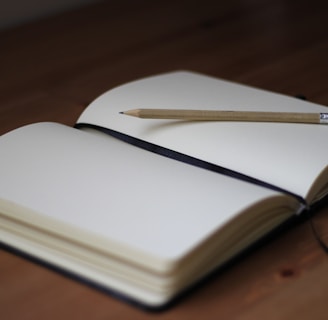How to Journal for Mental Health
Ever had one of those days where your thoughts are all over the place, and you just can’t seem to catch a break? Journaling might just be the mental health tool you need. It’s more than just writing in a notebook—it’s a way to clear your mind, process emotions, and take a step towards better mental health. Let’s break down how you can start journaling to improve your mental well-being.
HEALTH
Prathameshb7
8/24/20243 min read


1. Why Journaling?
Journaling isn’t just for poets or teenagers; it’s for anyone looking to better understand themselves. Think of it as a mental detox. By putting your thoughts on paper, you’re giving your mind a break, reducing stress, and gaining clarity on what’s really going on in your head.
2. Getting Started: What You Need
You don’t need much to start journaling—just a notebook and a pen. Or, if you’re more tech-savvy, a notes app on your phone works just as well. The key is to find a medium that feels comfortable for you. Here’s how to get started:
Pick Your Tools: Choose a notebook you love or a digital platform that’s easy to use.
Find Your Space: Dedicate a quiet spot where you can write without distractions.
Set Aside Time: Even 5-10 minutes a day can make a big difference.
3. What to Write About
The beauty of journaling is that there are no rules. You can write about anything that comes to mind. But if you’re feeling stuck, here are some prompts to get you going:
Daily Reflections: What happened today? How did it make you feel?
Gratitude Lists: What are three things you’re grateful for today?
Mood Check-ins: How are you feeling right now? Why do you think that is?
Future Goals: What are you working towards? What steps can you take to get there?
4. Types of Journaling
There’s more than one way to journal, and finding what works best for you is key. Here are a few types to consider:
Free Writing: Just start writing whatever comes to mind. Don’t worry about grammar or structure—just let your thoughts flow.
Bullet Journaling: This is more structured and involves making lists, tracking habits, and setting goals.
Art Journaling: If you’re more visually inclined, try combining words with drawings, doodles, or collages.
Prompted Journaling: Use specific prompts to guide your writing. This can help you dive deeper into particular emotions or situations.
5. How Often Should You Journal?
There’s no one-size-fits-all answer here. Some people find daily journaling to be incredibly helpful, while others might journal once a week. The key is consistency. Find a rhythm that works for you, and stick with it. Remember, it’s about quality, not quantity.
6. Overcoming Common Obstacles
Journaling isn’t always easy, especially when life gets busy. Here are some tips to help you stay on track:
Start Small: If journaling feels overwhelming, start with just a few sentences a day.
Be Honest: Your journal is a judgment-free zone. Write what you’re really feeling, even if it’s uncomfortable.
Don’t Stress About Perfection: Your journal doesn’t have to be a masterpiece. It’s for your eyes only, so let go of the pressure to make it perfect.
Make It a Habit: Attach journaling to an existing habit, like drinking your morning coffee or winding down before bed.
7. The Benefits of Journaling
Journaling has some pretty amazing mental health benefits. Here are a few you might notice:
Reduced Stress: Writing down your worries can help you process and release them.
Increased Self-Awareness: Regular journaling can help you understand your thoughts and behaviors better.
Improved Mood: Expressing your emotions can lead to a better mood and a more positive outlook.
Better Problem-Solving: Writing can help you think more clearly and come up with solutions to challenges.
8. Final Thoughts: Make It Your Own
Journaling is a personal journey, and there’s no right or wrong way to do it. The most important thing is to find a style that resonates with you and stick with it. Over time, you’ll likely find that journaling becomes a powerful tool for maintaining your mental health.
So, grab that notebook, find a cozy spot, and start writing. Your mind will thank you for it!
By keeping it simple and consistent, journaling can become a valuable part of your mental health routine. Happy journaling!
